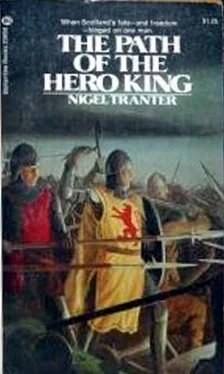Robert! Robert my liege, my son, my most dear friend-here is joy! So long, so long it has been. Three long years.
They clasped each other for a little, too overcome for coherent words.
Then they stood back and looked at each other-and the marks of those years were only too plain to see on both of them. Lamberton saw a lean, purposeful, strong man of a great natural dignity and almost alarming if unconscious authority, with keen distance-searching eyes yet with a gleam of humour about them.
Gone were the last traces of immaturity, the relics of youthful uncertainty and indecision. Here was a man in his prime, of body and of mind, but chiselled, tempered, almost graven in both as by a sculptor of fierce conviction. And Bruce saw a worn, lined and ravaged giant, old before his time-for Lamberton was but forty-six, with only eleven years between them-grey-haired, weary, but though bowed of frame most obviously not bowed in spirit.
The King had been demanding how came the other to St.
Andrews this March morning, but struck by the Bishops evident fatigue, took the older mans arm instead and led him towards his own tower.
You are tired. Come to my chamber. Eat and drink, while I dress. For this parliament. We can talk then …
But Lamberton gave him some information even as they mounted the stairs.
I am tired, yes-for I have been in the saddle since dawn yesterday and rested but two hours in the night. But that is nothing in my joy in seeing Your Grace. It more than makes up for any weariness of the flesh. It will be the leaving you again, the going that will tax me sorely-not this coming.
Leaving? Going? What do you mean?
Only that I have not long with you, Robert. A day and a night, no more. At this hour tomorrow I must be over Forth again and spurring for the Border.
Dear God-not that! Here is foolish talk indeed…
Not so, Sire. For what I have left of honour is at stake. You see before you a man forsworn. I have broken my word, my parole. All for love of you, my friend. I gave King Edward my word that I would remain in England. Only on condition that I did not return to Scotland was I released from my prison. I seek to tell myself that this means only that I would not return to abide here-not that I could not visit. But that is merest casuistry. I was not to leave Edwards realm. He trusted me. And I have done so. I must return forthwith.
But if the damage is done…?
Perhaps not. I came secretly. I am thought to be making a pilgrimage of the shrines of Saint Cuthbert, in Northumbria. For my sins! I left Hexham Priory at dawn yesterday, supposedly to make for a cell in the hills of Upper Tynedale. Instead, I hastened across the Border passes of Deadwater and the Note of the Gate, into Teviotdale. And so here, by secret ways we both know well. If I can return by the same route, and at the same pace, I may reach the Abbey of Lanercost two days hence. Where I am expected. And be thought only to have been travelling amongst the remote hill shrines. There is a Pilgrim Road. This I pray for-so shameless a deceiver I have become!
But your men? Your companions?
Only one, my personal servant, came with me from Hexham. In England I
do not ride the land like a prince of the Church! The others I picked up at my Abbey of Melrose, in Tweeddale.
In Bruces bedchamber, after Hay had paid his respects to the Bishop, and provided meat and drink, he and Irvine left King and Primate alone with reminders of the processions timing.
This parole of yours is a sore burden upon you, my friend, Bruce said, after a little, as he watched the other eat.
I am not one for breaking faith, as you know. But this was no ordinary demand upon you. It was the only way that you might regain freedom from prison, yes. But you were unlawfully imprisoned. You went to the English, before Methven, as an emissary from me. To imprison such emissary was a dishonourable act. And to hold captive for years a consecrated bishop of Holy Church, Primate of Scotland, to prevent him from ministering to his people-this is doubly unlawful, against the laws of God and man. In such circumstances is your given word to be held to? Is it not your duty, to your people, to me, to return to Scotland, by any means possible? You owe no duty to Edward of Carnarvon.
Think you I have not turned over and over in my mind all such thoughts, Sire? I had ample time to do so! It may be so, as regards my episcopal duty. But I have my personal honour to consider, surely? My given word, as a man. God forgive me, I have indeed broken it to be here at all. For that I might convince myself of excuse.
A visit only. But to stay in Scotland there could be no excuse. From my own conscience. It is my conscience that I fear, Robert-not King Edwards wrath.
Aye. I understand. Probably I would judge as you do.
Besides, I believe that I may indeed serve you best, my liege lord, by returning to England. Here I am Primate, Bishop, and your Chancellor, yes. But others can perform these duties, or represent me in them. Can any other do what I am in a position to do, in England? Here is why, after long thought, I gave my word. That young man, Edward Plantagenet, has a liking for me. Why, I know not. As he has a hatred and suspicion of his own bishops, Beck in especial. They were all his fathers creatures-and all to do with his father he hates. He sends me letters, messages, seeks my advice, summons me to wait on him. He is a strange man, weak yet wilful, stubborn. And I can influence him. Have already done so. And can learn much of what is planned, against you and Scotland. To inform you thereafter. God knows, I have no liking for the task, to act snake, deceiver, spy. But I can do it. And I tell myself that it is to the eventual benefit of England also-an end to oppression, invasion, peace with Scotland. Judass code, perhaps? But ..
I might achieve much. So my poor conscience is torn two ways … Yes.
I see it. You may be right. Already you have sent me vital tidings. About Edwards wedding. This Piers Gaveston, and the nobles resentment. You freed my hands, then, to deal with the North. That I can do with an ear, an eye and a voice at Edwards Court, there is no doubt. And you can … you can keep touch with my Elizabeth. Comfort her. That above all-although I should not say it! That above all. It came out in a rush. He had been urgent to ask about Elizabeth from the moment of their meeting.
Yes, my son-yes. I know it. Elizabeth. God bless her! God bless you both. Being permitted to visit her is a great matter. I see her when I can. She is well. Brave. Proud in her sorrows. You chose wisely in your wife, Robert. Sinfully, I have ever begrudged Bishop Beck of Durham in that he wed you, not me.
She is not misused? Maltreated? Humiliated?
No. She is not treated as a queen. But as the great Earl of Ulsters daughter she is respected. Young Edward does not love Ulster, his fathers friend. But he does not vent his spleen on the daughter-save to keep her closely warded. A strange man, he has not his sires savagery, but he hates almost as strongly. I think he hates the Scots little less than did Longshanks …
And his intentions, with Elizabeth? How long is he going to hold her captive?
That I know not. But I cannot raise false hopes for you, Sire. I would that I could say kinder. I think he will not release the Queen while ever you withstand him. Or your daughter. He uses them against you. Hoping your resolve will soften, your need and love for them bring you to terms. That is the English way …
Bruces groan was harsh.
Pityingly his friend eyed him.
It is an evil case. Here is dishonour indeed! But, at least, this Edward is less cruel. You heard that when I made representation to him, he ordered the release from their cages of your sister and the Countess of Buchan?
Читать дальше












